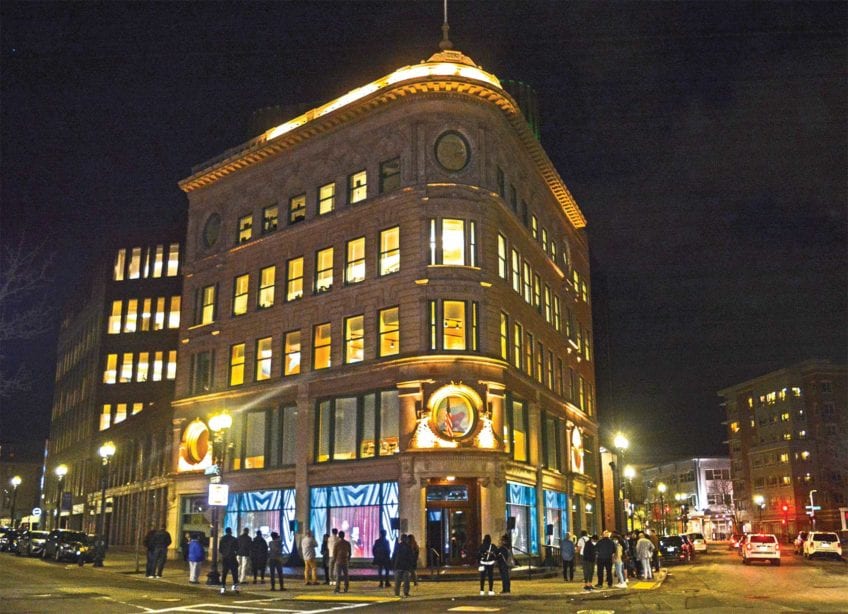‘Clybourne Park’ probes race, class with satire, smart cast
The SpeakEasy Stage Company is presenting the Boston premiere of “Clybourne Park” at the Calderwood Pavilion in the Boston Center for the Arts through April 6.
Boston Bruce Norris sets his Pulitzer Prize-winning play “Clybourne Park” in the house that Lena Younger buys in Lorraine Hansberry’s 1959 classic, “A Raisin in the Sun.”
In Act I, Norris offers a glimpse of the white neighbors awaiting the Youngers, the first African Americans to move into their community, Clybourne Park.
Act II revisits the house 50 years later, in 2009, as representatives of the now predominantly black neighborhood meet with the new owners, a white couple who want to tear it down and replace it with a bigger house.
A scathingly funny satire with a tragic undercurrent, Norris’s play premiered off-Broadway in February 2010 and two years later opened on Broadway, winning the Laurence Olivier Award for Best New Play and the 2012 Tony Award for best play.
The SpeakEasy Stage Company is presenting the Boston premiere of “Clybourne Park” at the Calderwood Pavilion in the Boston Center for the Arts through April 6.
Directed by M. Bevin O’Gara with sets by Cristina Todesco and costumes by Mary Lauve, the staging is as strong as the seven-member cast, who reincarnate as a new set of characters as they move from Act I to Act II. By using the same actors in both acts, Norris underscores his sardonic view that little has changed over 50 years when it comes to barriers of race, class and money.
In contrast to the big dreams of the Youngers, who yearn for a better life, this play’s five white characters measure their dreams in minutes shaved off a commute or in the extra footage of a new, taller house.
As Act I begins, Frank Sinatra croons the soothing Johnny Mercer classic, “Dreams.” Stacks of boxes surround Bev and Russ and their yet-unpacked furniture.
A kind and befuddled Bev, performed with self-effacing brilliance by Paula Plum, is trying to fob off a silver chafing dish to her African-American maid, Francine, the elegant Marvelyn MacFarlane. Francine politely declines, just as later, she graciously fends off Karl when he tries to draw her into his argument against integration.
In Karl, performed with the right comic desperation by Michael Kaye, Norris resurrects Hansberry’s sole white character, Karl Lindner. Philana Mia is hilarious as Karl’s deaf-mute wife Betsey, the only person who attempts to hear what others are trying to say. Fortunately, she is unable to hear her awful husband.
The production’s economical staging says a lot with a few telling details, including Lauve’s quietly satirical costumes. While the white characters wear Ozzie and Harriet attire, the two African Americans are the classiest looking people on the scene. When Francine sheds her apron, she is regal in a blue sheath and matching hat. Arriving to take her home, Francine’s husband Albert (DeLance Minifee) is dashing in a suit and tie.
As in Hansberry’s play, the man of the house is consumed with buried rage. Russ (the excellent Thomas Derrah) slouches in an armchair in his pajamas and exchanges a numbing barrage of trivia with Bev. When visitors arrive, he barely tolerates them. Provoked by the well-meaning questions of the local clergyman, Jim (Tim Spears), Russ fends him off with four-letter words and then threatens to punch him.
All these confrontations are great fun. But Russ and Bev are alone with a tragic secret they hope to leave behind, along with their dead son’s Army footlocker.
In Act II, 50 years later, a circle of young professionals outfitted in casual urban chic gathers in the house. The trivia goes upscale, but once more small talk, excessive politeness and joviality yield to heated exchanges.
Lena (MacFarlane), the niece of Lena Younger, her husband Kevin (Minifee) and their lawyer, Tom (Spears) represent the current Owners’ Association. They want to preserve the house as a landmark of the neighborhood’s African American heritage. In a high-minded but impotent speech, Lena says that her people have “a lot of pride,” resurrecting a poignant phrase from the climax of the Hansberry play.
The new owners are Steve (Michael Kaye) a reborn Karl, and his wife Lindsey (Philana Mia), a yuppie lawyer, accompanied by their real estate attorney, Kathy (Paula Plum). Embarrassed by her husband’s combative defense of their private property rights, Lindsey assures Lena, “Half of my friends are black!”
Thomas Derrah is Dan, the chatty workman who hauls in the footlocker he has unearthed from the yard while digging a trench for the couple’s koi pond. Like Russ in Act I, Dan is the only character who looks at the facts.






